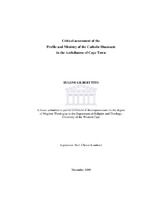| dc.description.abstract | The service of deacons in the Church is documented from Apostolic times. A tradition attested already by St. Ireneus and influenced in the liturgy of ordination, sees the origin of the diaconate in the institution of the “seven” mentioned in the Acts of the Apostles (6:1-6). St Paul refers to the deacons and to bishops in his letter to the Philippians. (1:1), while in his first letter to Timothy (3:8-13) he lists the qualities and virtues which they should possess so as to exercise their ministry worthily.While the permanent diaconate was maintained from earliest Apostolic times to the present in the Eastern rite churches (Orthodox and Catholic), it gradually disappeared in the western church during the first millennium. The diaconate continued as a vestigial form as a temporary, final step along the course to ordination to the priesthood in the western church. In the 20th Century, the Permanent Diaconate was restored in the western church.Following the recommendations of the Second Vatican Council (in Lumen Gentium29), in 1967 Pope Paul VI issued the motu proprio Sacrum Diaconatus Ordinem,restoring the ancient practice of ordaining to the diaconate men who were not candidates for priestly ordination.The permanent deacons are assigned to work in a parish and to assist priests in their pastoral and administrative duties, but report directly to the bishop who appoints them. Unlike most clerics, permanent deacons are married or single men who also have a secular profession.In the Archdiocese of Cape Town, the first deacons to be ordained to the order of Permanent deacons took place in 1980. In the early days, the archdiocese had a clear policy for diaconate training and formation. Priests requested men to study towards becoming deacons. Over the past 30 years the bishops have ordained close to 100 deacons to minister in 75 parishes throughout the Archdiocese.Today there is a need to try to understand why deacons lack the zeal and passion that was so prevalent at their ordinations. Is it due to their training or has a need a risen for a deeper theological understanding of the diaconate. Priests do not fully understand the ministry of the deacons which on occasions gives rise to conflict within the parish.Currently more and more communities are calling on the parish deacon before approaching their parish priest for advice. It is in these theoretical grounds that a critical assessment of the Profile and Ministry of the Catholic Diaconate in the Archdiocese of Cape Town was undertaken. This is pioneer research in the Archdiocese. | en_US |

